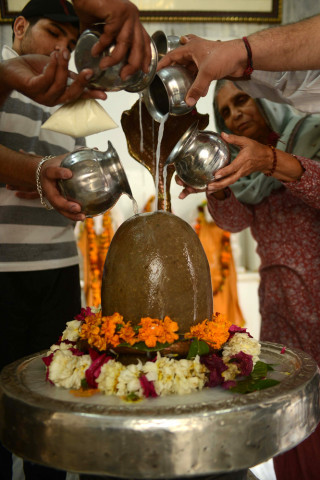Hindus to observe Night of Shiva from today
Few pilgrims likely to attend festival in Mansehra due to security situation.

According to the caretaker, only a small number of Hindu yatrees (pilgrims) are expected to attend this year’s festival due to the prevailing security situation. PHOTO: AFP
The three-day festival of Shivratri or Great Night of Shiva usually falls between mid-February and early March. It falls on 13th day of Phalguna, the twelfth month of the Hindu calendar. The festival marks the night when Lord Shiva married Parvati and performed the Tandaya Nritya or the dance of primordial creation, preservation and destruction.

“A special pooja will be performed at the temple in the morning,” said Darshan Lal Pujari, one of the temple’s caretakers. “The sacred festival will come to an end on February 18 with special pooja at 11am. After that, prashad will be distributed among the devotees at noon to mark the end of the festival.”
Security concerns
According to the caretaker, only a small number of Hindu yatrees (pilgrims) are expected to attend this year’s festival due to the prevailing security situation.
“The police have insisted we restrict the number of devotees to a minimum,” Pujari said. “Last year, over 700 families from various parts of country attended the celebrations. However, this year’s turnout is likely to be comparatively smaller.”
Nonetheless, security has been tightened around the temple and all arrangements have been made to avoid an untoward situation.
Pujari appreciated the efforts made by Muslims who live near the temple for providing pilgrims with a place to stay during the Shivratri festival.
“The local community has offered devotees residential facilities at their houses and hujras,” he said. “Every year, congestion has been a major problem as there isn’t enough space at the temple to accommodate the pilgrims since it is built over only 13 marlas of land. As a result, support from the local community comes as a blessing in disguise.”
Published in The Express Tribune, February 16th, 2015.













COMMENTS
Comments are moderated and generally will be posted if they are on-topic and not abusive.
For more information, please see our Comments FAQ